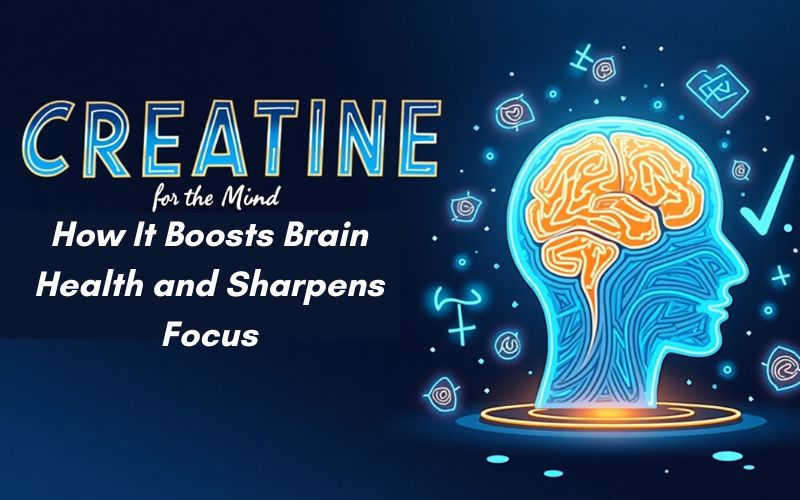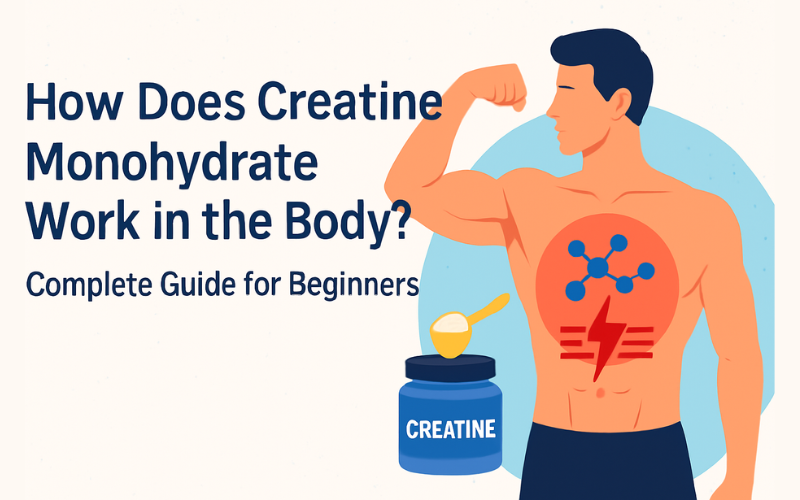Creatine is often associated with gym gains and physical performance but what if it’s also a powerful supplement for the brain? Recent research reveals that creatine isn’t just for building muscle; it plays a significant role in cognitive health, mental clarity, and focus. This article explores how creatine benefits your brain, why it’s worth considering for mental performance, and how you can use it effectively.
Table of Contents
What Is Creatine and How Does It Work in the Brain?
Creatine is a naturally occurring compound found in your muscles and brain. It’s produced by the liver, kidneys, and pancreas, and is also obtained through foods like red meat and fish. While creatine is mostly known for helping muscles regenerate energy during intense exercise, it also performs similar functions in the brain.
The brain is one of the most energy-demanding organs in the body. It relies on a molecule called ATP (adenosine triphosphate) for energy. Creatine helps rapidly recycle ATP, ensuring that your brain cells maintain a steady energy supply. This energy boost can improve several mental functions, especially under stress or fatigue.
Cognitive Benefits of Creatine Supplementation
Several scientific studies have highlighted the brain-boosting effects of creatine, particularly in situations where mental performance tends to decline. Let’s explore some of the most well-supported cognitive benefits:
1. Improved Memory and Learning
Creatine has been shown to enhance working memory and short-term memory especially in individuals who are sleep-deprived or under stress. A study published in Psychopharmacology found that young adults who were supplemented with creatine performed better on memory and intelligence tests compared to a placebo group.
2. Enhanced Focus and Mental Clarity
One of the biggest reported benefits of creatine is improved focus. When the brain has consistent energy, attention span and concentration are less likely to dip. Creatine helps reduce mental fatigue, making it easier to stay alert during long periods of work or study.
3. Support During Sleep Deprivation and Mental Fatigue
In today’s fast-paced world, many people operate on minimal sleep. Research shows that creatine supplementation can counteract some of the cognitive deficits associated with sleep deprivation. It helps maintain mental sharpness and decision-making abilities, even when you’re running low on rest.
4. Potential Protection Against Neurological Diseases
There’s growing interest in creatine’s potential to protect the brain from neurodegenerative diseases like Parkinson’s and Alzheimer’s. While more research is needed, early studies indicate that creatine may help protect neurons and reduce oxidative stress, potentially slowing cognitive decline over time.
Who Can Benefit from Creatine for Cognitive Health?
While athletes commonly use creatine, its cognitive benefits make it a smart choice for a wider audience:
- Students looking for a natural mental performance boost during exams
- Professionals dealing with long hours, multitasking, and mental fatigue
- Older adults who want to preserve memory and cognitive function
- Vegans and vegetarians, who typically have lower natural creatine levels due to lack of meat in their diet
How to Take Creatine for Mental Performance
To enjoy the brain-boosting effects of creatine, the standard dosage is similar to that used for physical performance 3 to 5 grams per day. There’s no need for a loading phase if your primary goal is cognitive enhancement.
Consistency is key. Since creatine builds up in the brain over time, daily use for a few weeks is usually required to notice significant benefits. Make sure to stay hydrated, as creatine draws water into your cells.
Is Creatine Safe for Long-Term Use?
Yes, creatine is one of the most studied and safest supplements on the market. Numerous long-term studies show no harmful effects on healthy individuals when taken at recommended doses. However, those with pre-existing kidney conditions should consult a healthcare provider before starting supplementation.
FAQs
Q: Can creatine make me smarter?
Creatine won’t turn you into a genius overnight, but it can support better memory, focus, and mental clarity especially when your brain is under stress.
Q: How long does it take to feel the cognitive effects of creatine?
Most people start noticing improvements in focus and mental clarity after 2 to 4 weeks of daily supplementation.
Q: Is creatine only for athletes?
Not at all. While athletes use it for performance, its cognitive benefits are valuable for students, professionals, and older adults as well.
Q: Can I get enough creatine from food?
You can get creatine from meat and fish, but the amount may be lower than what’s needed for optimal cognitive benefits. Supplementing ensures consistency and effectiveness.
Q: What type of creatine is best for brain health?
Creatine monohydrate is the most researched and recommended form. It’s safe, effective, and affordable.
Conclusion: Fuel Your Brain with Creatine
Creatine is more than a muscle-building supplement; it’s a powerful ally for your brain. From improved memory and focus to better stress resilience and long-term brain protection, creatine offers a simple yet effective way to enhance your mental performance naturally.
If you’re ready to support your cognitive health with high-quality supplements, visit Nutritional World to explore our selection of premium creatine products. Start feeding your mind the fuel it needs to perform at its best—naturally, safely, and effectively.


























